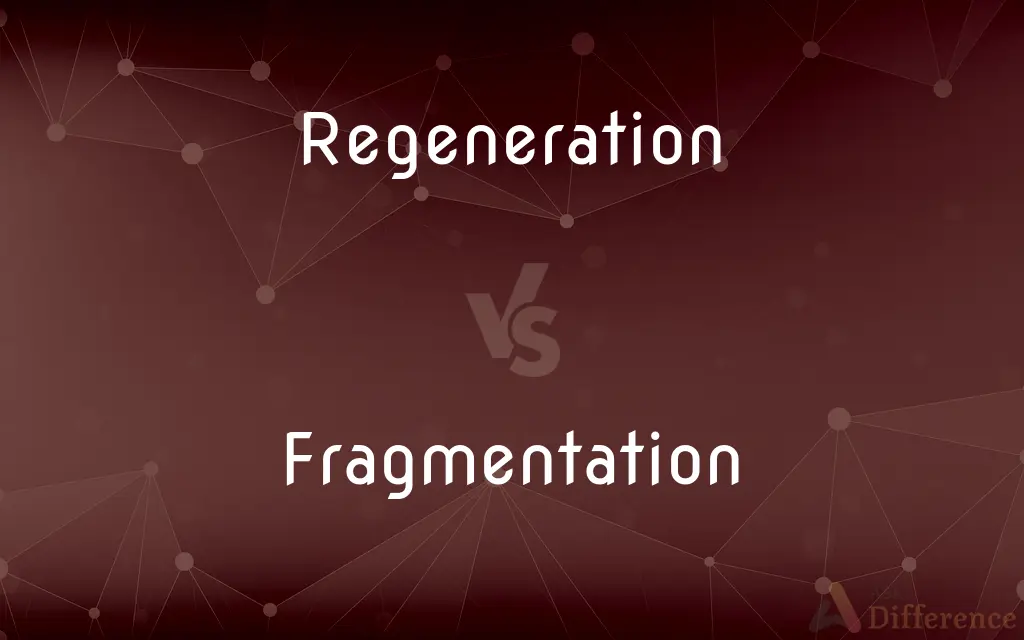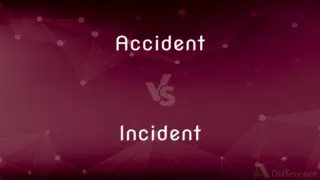Regeneration vs. Fragmentation — What's the Difference?
By Maham Liaqat & Urooj Arif — Updated on March 9, 2024
Regeneration is the process where organisms regrow lost parts, while fragmentation involves an organism breaking into pieces, each capable of growing into a new individual.

Difference Between Regeneration and Fragmentation
Table of Contents
ADVERTISEMENT
Key Differences
Regeneration is a biological process where organisms regrow lost or damaged tissues, organs, or body parts. This remarkable ability is observed in various species, such as starfish regrowing arms or lizards regenerating tails. Fragmentation, on the other hand, is a form of asexual reproduction where an organism splits into fragments, and each fragment develops into a mature, fully grown individual. This process is common in some invertebrates, plants, and fungi.
Regeneration involves complex cellular mechanisms where the organism's cells near the damaged or lost part proliferate and differentiate to replace the missing structure. Regeneration can vary significantly among species, from simple wound healing to the complete regrowth of functional organs. While in fragmentation organism's body is structured in such a way that if it's broken into pieces, each piece has the necessary cellular machinery and genetic information to grow into a complete organism.
While regeneration primarily serves as a means to repair and maintain an organism's body after injury, fragmentation is a reproductive strategy to increase the organism's numbers. In regeneration, the focus is on restoring the original structure and function of the lost part. In contrast, fragmentation creates entirely new individuals from parts of the parent organism.
Both processes showcase the remarkable plasticity and adaptability of life, enabling organisms to survive and thrive in their environments through either recovery from injury or asexual reproduction. However, the mechanisms, purposes, and outcomes of regeneration and fragmentation are distinct, reflecting the diverse strategies life has evolved to cope with challenges and opportunities in nature.
Comparison Chart
Purpose
Repair and replace lost/damaged parts
Asexual reproduction
ADVERTISEMENT
Process
Cellular proliferation and differentiation to regrow parts
Organism breaks into pieces, each growing into a new individual
Examples
Starfish arms, lizard tails
Annelid worms, certain sea stars
Function
Maintains organism's integrity and functionality
Increases organism's numbers
Outcome
Restored part of the original organism
New, complete individuals
Compare with Definitions
Regeneration
Biological process of regrowing lost parts.
A salamander can regenerate its lost limb.
Fragmentation
Asexual reproduction through organism division.
Many coral species reproduce through fragmentation.
Regeneration
Involves complex cellular mechanisms.
Liver regeneration is a vital process after partial hepatectomy.
Fragmentation
Each piece grows into a new individual.
Certain types of starfish can regenerate from a single arm segment.
Regeneration
Observed in various species across the animal kingdom.
Planarians are known for their remarkable regenerative abilities.
Fragmentation
Strategy to increase population numbers.
Fragmentation in fungi helps spread spores widely.
Regeneration
Can vary from simple healing to complete organ regrowth.
Some lizards regenerate their tails.
Fragmentation
Requires each fragment to have essential growth components.
Earthworms can sometimes regenerate from segments.
Regeneration
Maintains the individual's integrity.
Humans can regenerate damaged skin tissue.
Fragmentation
Common in invertebrates and some plants.
Spirogyra, a type of algae, reproduces by fragmentation.
Regeneration
(Biology) Regrowth of lost or destroyed parts or organs.
Fragmentation
The act or process of breaking into fragments.
Regeneration
Spiritual or moral revival or rebirth.
Fragmentation
The scattering of the fragments of an exploding bomb or other projectile.
Regeneration
Rebuilding or restructuring; large scale repair or renewal.
The conversion of so many old industrial buildings into living quarters was a major factor in the regeneration.
Fragmentation
(Computers) The scattering of parts of a file or files throughout a storage device, as when the operating system breaks up the file and fits it into the spaces left vacant by previously deleted files.
Regeneration
(theology) Spiritual rebirth; the change from a carnal or material life to a pious one
Fragmentation
The act of fragmenting or something fragmented; disintegration.
Regeneration
(Christianity) The renewal of the world at the second coming of Christ.
Fragmentation
The process by which fragments of an exploding bomb scatter.
Regeneration
The process by which a water softener flushes out minerals extracted from the water supply.
Fragmentation
(computing) The breaking up and dispersal of a file into non-contiguous areas of a disk.
Regeneration
The ability to rapidly heal substantial physical damage to one's body, or to spontaneously restore hit points.
Fragmentation
(computing) The breaking up of a data packet when larger than the transmission unit of a network.
Regeneration
The act of regenerating, or the state of being regenerated.
Fragmentation
The act or process of separating something into small pieces or fine particles.
Regeneration
The entering into a new spiritual life; the act of becoming, or of being made, Christian; that change by which holy affectations and purposes are substituted for the opposite motives in the heart.
He saved us by the washing of regeneration, and renewing of the Holy Chost.
Fragmentation
Separating something into fine particles
Regeneration
The reproduction of a part which has been removed or destroyed; re-formation; - a process especially characteristic of a many of the lower animals; as, the regeneration of lost feelers, limbs, and claws by spiders and crabs.
Fragmentation
The disintegration of social norms governing behavior and thought and social relationships
Regeneration
The reproduction or renewal of tissues, cells, etc., which have been used up and destroyed by the ordinary processes of life; as, the continual regeneration of the epithelial cells of the body, or the regeneration of the contractile substance of muscle.
Fragmentation
(computer science) the condition of a file that is broken up and stored in many different locations on a magnetic disk;
Fragmentation slows system performance because it takes extra time to locate and assemble the parts of the fragmented file
Regeneration
(biology) growth anew of lost tissue or destroyed parts or organs
Fragmentation
The scattering of bomb fragments after the bomb explodes
Regeneration
Feedback in phase with (augmenting) the input
Regeneration
The activity of spiritual or physical renewal
Regeneration
Forming again (especially with improvements or removal of defects); renewing and reconstituting
Common Curiosities
How do organisms know how to regenerate or form new individuals from fragments?
Genetic and cellular mechanisms guide regeneration and fragmentation, ensuring accurate growth and development.
Can fragmentation occur naturally or only through external forces?
Fragmentation can occur naturally as a regular reproductive strategy or result from environmental factors or injuries.
Are there limits to what can be regenerated?
Yes, the ability to regenerate is limited by the organism's biology and can range from simple tissue to entire limbs or organs.
Is regeneration common in mammals?
Mammals have limited regenerative abilities compared to other groups like amphibians and certain invertebrates.
How does fragmentation contribute to an organism's survival?
It allows rapid population increase and colonization of new areas, enhancing survival and dispersal.
Can regeneration lead to immortality in some species?
In some species, like certain jellyfish, regeneration contributes to a form of biological immortality by continually renewing tissues.
Is human limb regeneration possible?
Currently, humans cannot regenerate entire limbs, but research into regenerative medicine aims to unlock more of this potential.
Can all organisms regenerate?
While many organisms have some regenerative capability, the extent and complexity of regeneration vary widely among species.
How do environmental conditions affect regeneration and fragmentation?
Conditions like temperature, nutrition, and habitat can influence the efficiency and speed of these processes.
Can regeneration or fragmentation be induced artificially?
In some cases, scientific interventions can induce or enhance these processes for research or therapeutic purposes.
Is regeneration the same as healing?
Healing is part of regeneration, involving repair and closure of wounds, but regeneration involves the complete regrowth of lost parts.
Are there ethical concerns with studying or manipulating these processes?
Ethical considerations arise, especially in potential human applications, concerning safety, consent, and long-term impacts.
What are the evolutionary implications of regeneration and fragmentation?
These abilities illustrate evolutionary strategies for survival, adaptation, and reproductive success across different environments.
How do regeneration and fragmentation impact ecosystem dynamics?
They play roles in population control, species diversity, and the resilience of ecosystems to environmental changes.
Can studying these processes lead to medical advancements?
Yes, understanding regeneration and fragmentation can inform regenerative medicine, tissue engineering, and other therapeutic strategies.
Share Your Discovery

Previous Comparison
Crystal vs. Gem
Next Comparison
Accident vs. IncidentAuthor Spotlight
Written by
Maham LiaqatCo-written by
Urooj ArifUrooj is a skilled content writer at Ask Difference, known for her exceptional ability to simplify complex topics into engaging and informative content. With a passion for research and a flair for clear, concise writing, she consistently delivers articles that resonate with our diverse audience.














































